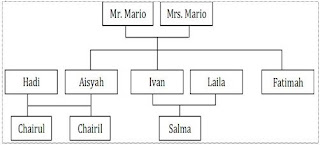| No | KOMPETENSI DASAR | MATERI | INDIKATOR SOAL | LEVEL KOGNITIF | BENTUK SOAL |
|---|
| 1 | 3.4 menganalisis fungsi sosial, struktur teks, dan unsur kebahasaan pada teks lisan dan tulis tentang kegiatan rutin/ kebiasaan, sesuai konteks penggunaannya. | Rutinitas / kebiasaan sehari-hari | Disajikan dialog rumpang tentang rutinitas / kebiasaan sehari-hari, siswa dapat melengkapi dialog tersebut dengan tepat | C4 | PG |
| 2 | 3.5 menganalisis fungsi sosial, struktur teks, dan unsur kebahasaan pada teks lisan dan tulis tentang niat melakukan suatu tindakan/kegiatan, sesuai dengan konteks penggunaannya | Rencana / niat melakukan suatu kegiatan | Disajikan dialog rumpang tentang rencana / niat melakukan suatu kegiatan, siswa dapat melengkapi dialog tersebut dengan tepat | C4 | PG |
| 3 | 3.6 menganalisis fungsi sosial, struktur teks, dan unsur kebahasaan pada teks mengenai pengandaian jika terjadi suatu keadaan/kejadian di waktu yang akan datang (Conditional Sentence type 1), sesuai dengan konteks. | Conditional type 1 | Disajikan dialog rumpang tentang pengandaian (Conditional type 1), siswa dapat menganalisa kalimat / kata kerja yang tepat untuk melengkapi dialog tersebut | C4 | PG |
| 4 | 3.7 menganalisis fungsi sosial, struktur teks, dan unsur kebahasaan dari teks deskriptif lisan dan tulis tentang orang,tempat dan benda, sesuai dengan konteks penggunaannya. | Deskripsi tentang seseorang | Disajikan dialog rumpang tentang deskripsi seseorang, siswa dapat menyimpulkan kalimat / ungkapan yang tepat untuk melengkapi dialog tersebut | C5 | PG |
| 5 | 3.8 menganalisis fungsi sosial, struktur teks, dan unsur kebahasaan pada teks lisan dan tulis tentang memberi dan meminta informasi terkait tindakan/kejadian yang dilakukan/terjadi di waktu lampau yang merujuk waktu terjadinya dan kesudahannya, sesuai dengan konteks penggunaannya. | Tindakan/kejadian di waktu lampau | Disajikan dialog rumpang tentang kejadian di waktu lampau, siswa dapat menganalisa kalimat / kata kerja yang tepat untuk melengkapi dialog tersebut | C4 | PG |
| 6 | 3.10 menganalisis fungsi sosial, struktur teks, dan unsur kebahasaan pada teks naratif sederhana berbentuk legenda rakyat, sesuai dengan konteks penggunaannya | Teks naratif ( legenda / cerita rakyat) | Disajikan sebuah teks naratif ( legenda / cerita rakyat), siswa dapat menarik kesimpulan tentang isi teks tersebut dengan tepat | C5 | PG |
| 7 | 3.10 menganalisis fungsi sosial, struktur teks, dan unsur kebahasaan pada teks naratif sederhana berbentuk legenda rakyat, sesuai dengan konteks penggunaannya | Teks naratif ( legenda / cerita rakyat) | Disajikan sebuah teks naratif ( legenda / cerita rakyat), siswa dapat menyimpulkan pesan yang terkandung dalam teks tersebut dengan tepat | C5 | PG |
| 8 | 3.10 menganalisis fungsi sosial, struktur teks, dan unsur kebahasaan pada teks naratif sederhana berbentuk legenda rakyat, sesuai dengan konteks penggunaannya | Teks naratif ( legenda / cerita rakyat) | Disajikan sebuah teks naratif ( legenda / cerita rakyat), siswa dapat menganalisa makna kata ganti benda (pronoun) dengan tepat | C4 | PG |
| 9 | 3.10 menganalisis fungsi sosial, struktur teks, dan unsur kebahasaan pada teks naratif sederhana berbentuk legenda rakyat, sesuai dengan konteks penggunaannya | Teks naratif ( legenda / cerita rakyat) | Disajikan sebuah teks naratif ( legenda / cerita rakyat), siswa dapat menentukan padanan kata dengan tepat | C3 | PG |
| 10 | 3.1 menganalisis fungsi sosial, struktur teks, dan unsur kebahasaan pada teks tentang ungkapan meminta dan memberi saran (suggestion), sesuai dengan konteks penggunaannya. | Giving suggestion | Disajikan dialog rumpang tentang sebuah permasalahan, siswa dapat menyimpulkan saran yang tepat untuk melengkapi dialog tersebut | C5 | PG |
| 11 | 3.2 menganalisis fungsi sosial, struktur teks, dan unsur kebahasaan pada teks tentang ungkapan memberi dan meminta pendapat (opinion), sesuai dengan konteks penggunaannya | Giving opinions | Disajikan dialog rumpang tentang pendapat, siswa dapat menyimpulkan pendapat / respon yang tepat untuk melengkapi dialog tersebut. | C5 | PG |
| 12 | 3.3 menganalisis fungsi sosial, struktur teks, dan unsur kebahasaan teks undangan resmi sesuai dengan konteks penggunaannya | Invitation letter | Disajikan sebuah teks undangan resmi, siswa dapat menyimpulkan tujuan teks tersebut dengan tepat | C5 | PG |
| 13 | 3.3 menganalisis fungsi sosial, struktur teks, dan unsur kebahasaan teks undangan resmi sesuai dengan konteks penggunaannya | Invitation letter | Disajikan sebuah teks undangan resmi, siswa dapat menganalisa informasi terperinci yang terkandung dalam teks tersebut | C4 | PG |
| 14 | 3.4 menganalisis fungsi sosial, struktur teks, dan unsur kebahasaan dari teks ilmiah faktual ( factual report) terkait isu aktual, sesuai dengan konteks penggunaannya | Teks factual report | Disajikan sebuah teks ilmiah faktual (factual report), siswa dapat menarik kesimpulan tentang isi /tujuan teks tersebut | C5 | PG |
| 15 | 3.4 menganalisis fungsi sosial, struktur teks, dan unsur kebahasaan dari teks ilmiah faktual ( factual report) terkait isu aktual, sesuai dengan konteks penggunaannya | Teks factual report | Disajikan sebuah teks ilmiah faktual (factual report), siswa dapat menganalisa informasi terinci yang tersirat dalam teks tersebut | C4 | PG |
| 16 | 3.4 menganalisis fungsi sosial, struktur teks, dan unsur kebahasaan dari teks ilmiah faktual ( factual report) terkait isu aktual, sesuai dengan konteks penggunaannya | Teks factual report | Disajikan sebuah teks ilmiah faktual (factual report), siswa dapat menganalisa referensi makna yang tepat dari sebuah kata ganti benda (pronoun) di dalam teks | C4 | PG |
| 17 | 3.4 menganalisis fungsi sosial, struktur teks, dan unsur kebahasaan dari teks ilmiah faktual ( factual report) terkait isu aktual, sesuai dengan konteks penggunaannya | Teks factual report | Disajikan sebuah teks ilmiah faktual (factual report), siswa dapat menentukan padanan kata (sinonim) yang tepat dan sesuai dengan konteks di dalam teks | C3 | PG |
| 18 | 3.5 menganalisis fungsi sosial, struktur teks, dan unsur kebahasaan pada ungkapan permintaan (request), sesuai dengan konteks penggunaannya | Requests | Disajikan sebuah dialog rumpang tentang permintaan (request), siswa dapat menyimpulkan kalimat permintaan / respon yang tepat untuk melengkapi dialog tersebut | C5 | PG |
| 19 | 3.7 menganalisis fungsi sosial, struktur teks, dan unsur kebahasaan pada teks pemberitahuan/pengumuman (announcement), sesuai dengan konteks penggunaannya | Announcement | Disajikan sebuah teks pengumuman (announcement), siswa dapat menyimpulkan isi /tujuan teks tersebut | C5 | PG |
| 20 | 3.7 menganalisis fungsi sosial, struktur teks, dan unsur kebahasaan pada teks pemberitahuan/pengumuman (announcement), sesuai dengan konteks penggunaannya | Announcement | Disajikan sebuah teks pengumuman (announcement), siswa dapat menganalisa informasi terperinci dalam teks tersebut | C4 | PG |
| 21 | 3.9 menganalisis fungsi sosial, struktur teks dan unsur kebahasaan pada ungkapan pengandaian tentang suatu hal yang tidak terjadi di waktu sekarang (conditional sentence type 2), sesuai dengan konteks penggunaannya. | Conditional sentence type 2 | Disajikan sebuah dialog berisi kalimat pengandaian (conditional sentence) type 2 yang tidak lengkap, siswa dapat menentukan bagian kalimat yang tepat untuk melengkapi kalimat tersebut | C3 | PG |
| 22 | 3.10 menganalisis fungsi sosial, struktur teks, dan unsur kebahasaan teks tentang ungkapan penawaran barang dan jasa (offering things and service), sesuai dengan konteks penggunaannya. | Making an Offer | Disajikan sebuah dialog rumpang tentang penawaran (offer), siswa dapat menyimpulkan kalimat penawaran / respon yang tepat untuk melengkapi dialog tersebut | C5 | PG |
| 23 | 3.12 menganalisis fungsi sosial, struktur teks, dan unsur kebahasaan teks tentang ungkapan memberi dan meminta informasi petunjuk arah (asking and giving direction), sesuai dengan konteks penggunaannya. | Asking direction | Disajikan sebuah dialog rumpang tentang petunjuk arah, siswa dapat menyimpulkan kalimat permintaan petunjuk arah / respon yang tepat untuk melengkapi dialog tersebut | C5 | PG |
| 24 | 3.13 menilai hal yang dapat diteladani dari tokoh dalam teks biografi dan menganalisis fungsi sosial, struktur teks, dan unsur kebahasaan pada teks biografi tokoh sesuai dengan konteks penggunaannya. | Teks recount (biografi) | Disajikan sebuah teks recount (biografi) tokoh terkenal, siswa dapat menyimpulkan isi /tujuan teks tersebut | C5 | PG |
| 25 | 3.13 menilai hal yang dapat diteladani dari tokoh dalam teks biografi dan menganalisis fungsi sosial, struktur teks, dan unsur kebahasaan pada teks biografi tokoh sesuai dengan konteks penggunaannya. | Teks recount (biografi) | Disajikan sebuah teks recount (biografi) tokoh terkenal, siswa dapat menyimpulkan hal yang dapat diteladani dari tokoh dalam teks | C5 | PG |
| 26 | 3.13 menilai hal yang dapat diteladani dari tokoh dalam teks biografi dan menganalisis fungsi sosial, struktur teks, dan unsur kebahasaan pada teks biografi tokoh sesuai dengan konteks penggunaannya. | Teks recount (biografi) | Disajikan sebuah teks recount (biografi) tokoh terkenal, siswa dapat menganalisa referensi makna yang tepat dari sebuah kata ganti benda (pronoun) di dalam teks | C4 | PG |
| 27 | 3.13 menilai hal yang dapat diteladani dari tokoh dalam teks biografi dan menganalisis fungsi sosial, struktur teks, dan unsur kebahasaan pada teks biografi tokoh sesuai dengan konteks penggunaannya. | Teks recount (biografi) | Disajikan sebuah teks recount (biografi) tokoh terkenal, siswa dapat menentukan padanan kata (sinonim) yang tepat dan sesuai dengan kata di dalam teks | C3 | PG |
| 28 | 3.2 menganalisis fungsi sosial, struktur teks, dan unsur kebahasaan pada ungkapan pengandaian tentang hal yang tidak terjadi di masa lampau (conditional sentence type 3), sesuai konteks penggunaannya | Conditional sentence type 3 | Disajikan sebuah dialog berisi kalimat pengandaian (conditional sentence) type 3, siswa dapat menyimpulkan makna dari kalimat pengandaian tersebut | C5 | PG |
| 29 | 3.3 menganalisis fungsi sosial, struktur teks, dan unsur kebahasaan pada teks tentang tugas pekerjaan dan latar belakang pendidikan /pengalaman kerja, sesuai konteks penggunaannya | Job responsibility / experience | Disajikan dialog rumpang tentang tanggung jawab pekerjaan, siswa dapat menyimpulkan kata/kalimat yang tepat untuk melengkapi dialog tersebut | C4 | PG |
| 30 | 3.5 menganalisis fungsi sosial, struktur teks, dan unsur kebahasaan pada teks prosedur sederhana sesuai dengan konteks penggunaannya | Teks procedure | Disajikan sebuah teks procedure, siswa dapat menyimpulkan isi /tujuan teks tersebut | C5 | PG |
| 31 | 3.5 menganalisis fungsi sosial, struktur teks, dan unsur kebahasaan pada teks prosedur sederhana sesuai dengan konteks penggunaannya | Teks procedure | Disajikan sebuah teks procedure, siswa dapat menganalisa informasi terperinci dalam teks tersebut | C4 | PG |
| 32 | 3.5 menganalisis fungsi sosial, struktur teks, dan unsur kebahasaan pada teks prosedur sederhana sesuai dengan konteks penggunaannya | Teks procedure | Disajikan sebuah teks procedure, siswa dapat menganalisa referensi makna yang tepat dari sebuah kata ganti benda (pronoun) di dalam teks | C4 | PG |
| 33 | 3.5 menganalisis fungsi sosial, struktur teks, dan unsur kebahasaan pada teks prosedur sederhana sesuai dengan konteks penggunaannya | Teks procedure | Disajikan sebuah teks procedure, siswa dapat menentukan padanan kata (sinonim) yang tepat dan sesuai dengan kata di dalam teks | C3 | PG |
| 34 | 3.6 menganalisis fungsi sosial, struktur teks, dan unsur kebahasaan pada teks eksposisi terkait isu aktual, sesuai konteks penggunaannya | Analytical exposition | Disajikan sebuah teks analytical exposition, siswa dapat menyimpulkan isi /tujuan teks tersebut | C5 | PG |
| 35 | 3.6 menganalisis fungsi sosial, struktur teks, dan unsur kebahasaan pada teks eksposisi terkait isu aktual, sesuai konteks penggunaannya | Analytical exposition | Disajikan sebuah teks analytical exposition, siswa dapat menganalisa informasi dalam teks | C4 | PG |
| 36 | 3.6 menganalisis fungsi sosial, struktur teks, dan unsur kebahasaan pada teks eksposisi terkait isu aktual, sesuai konteks penggunaannya | Analytical exposition | Disajikan sebuah teks analytical exposition, siswa dapat menganalisa referensi makna yang tepat dari sebuah kata ganti benda (pronoun) di dalam teks | C4 | PG |
| 37 | 3.6 menganalisis fungsi sosial, struktur teks, dan unsur kebahasaan pada teks eksposisi terkait isu aktual, sesuai konteks penggunaannya | Analytical exposition | Disajikan sebuah teks analytical exposition, siswa dapat menentukan padanan kata (sinonim) yang tepat dan sesuai dengan kata di dalam teks | C3 | PG |
| 38 | 3.7 menganalisis fungsi sosial, struktur teks dan unsur kebahasaan pada teks surat bisnis sederhana sesuai dengan konteks penggunannnya | Business letter | Disajikan sebuah teks Business letter, siswa dapat menyimpulkan isi /tujuan teks tersebut dengan tepat | C5 | PG |
| 39 | 3.7 menganalisis fungsi sosial, struktur teks dan unsur kebahasaan pada teks surat bisnis sederhana sesuai dengan konteks penggunannnya | Business letter | Disajikan sebuah teks Business letter, siswa dapat memprediksi tindakan apa yang diharapkan secara tepat | C5 | PG |
| 40 | 3.7 menganalisis fungsi sosial, struktur teks dan unsur kebahasaan pada teks surat bisnis sederhana sesuai dengan konteks penggunannnya | Business letter | Disajikan sebuah teks Business letter, siswa dapat menentukan padanan kata (sinonim) yang tepat dan sesuai dengan kata di dalam teks | C3 | PG |
| 41 | 3.9 menganalisis fungsi sosial, struktur teks, dan unsur kebahasaan pada teks news item sederhana, lisan dan tulis, sesuai dengan konteks penggunaannya | Teks news item | Disajikan sebuah teks news item tentang bencana alam, siswa dapat menyimpulkan judul / isi teks tersebut dengan tepat | C5 | Essay |
| 42 | 3.9 menganalisis fungsi sosial, struktur teks, dan unsur kebahasaan pada teks news item sederhana, lisan dan tulis, sesuai dengan konteks penggunaannya | Teks news item | Disajikan sebuah teks news item tentang bencana alam, siswa dapat menentukan informasi penyebab kejadian dalam teks | C3 | Essay |
| 43 | 3.9 menganalisis fungsi sosial, struktur teks, dan unsur kebahasaan pada teks news item sederhana, lisan dan tulis, sesuai konteks penggunaannya | Teks news item | Disajikan sebuah teks news item tentang bencana alam, siswa dapat memprediksi tindak lanjut yang akan / harus dilakukan | C5 | Essay |
| 44 | 3.8 menganalisis fungsi sosial, struktur teks dan unsur kebahasaan pada teks monolog lisan dan tulis di tempat umum dan kerja sesuai dengan konteks penggunaannya. | Memo | Disajikan sebuah teks memorandum, siswa dapat menentukan siapa pengirim/penerima memo tersebut | C3 | Essay |
| 45 | 3.8 menganalisis fungsi sosial, struktur teks dan unsur kebahasaan pada teks monolog lisan dan tulis di tempat umum dan kerja sesuai dengan konteks penggunaannya. | Memo | Disajikan sebuah teks memorandum, siswa dapat menganalisa tindakan apa yang diharapkan dari memo tersebut | C4 | Essay |











